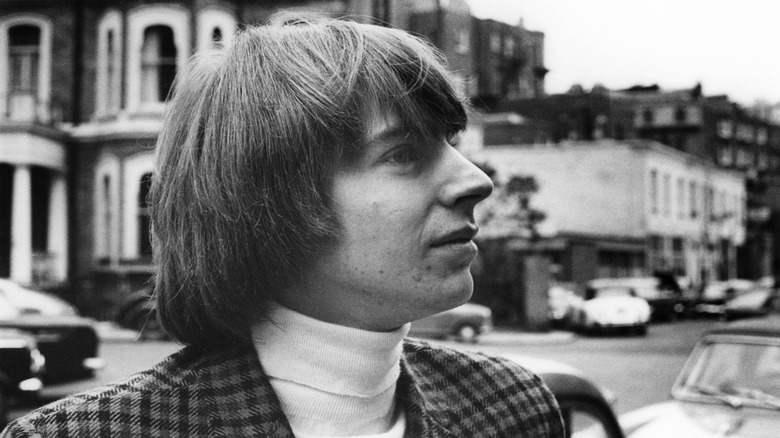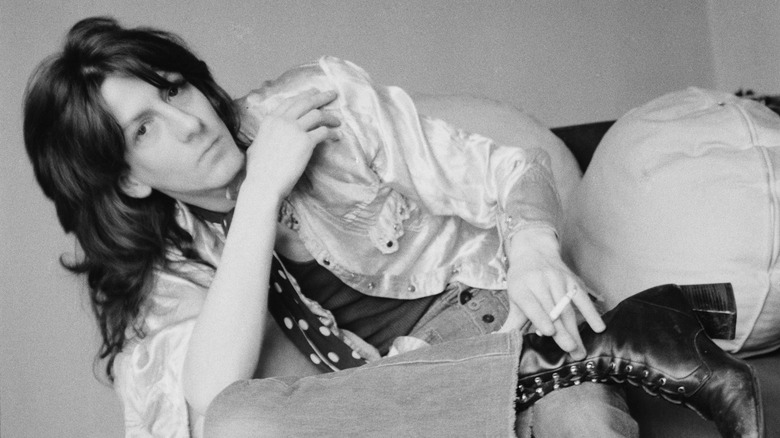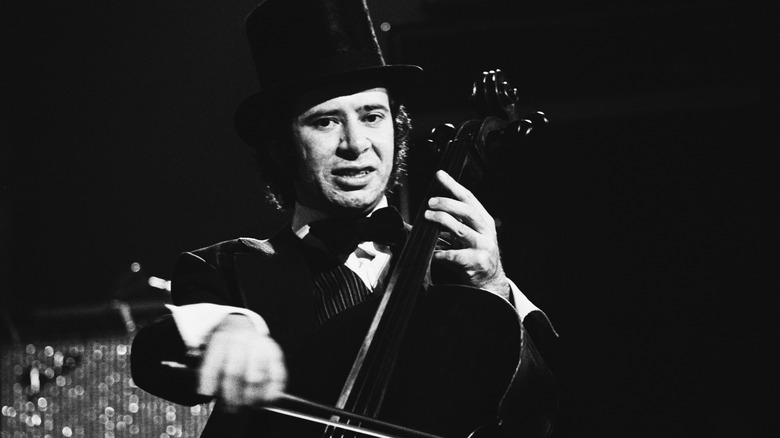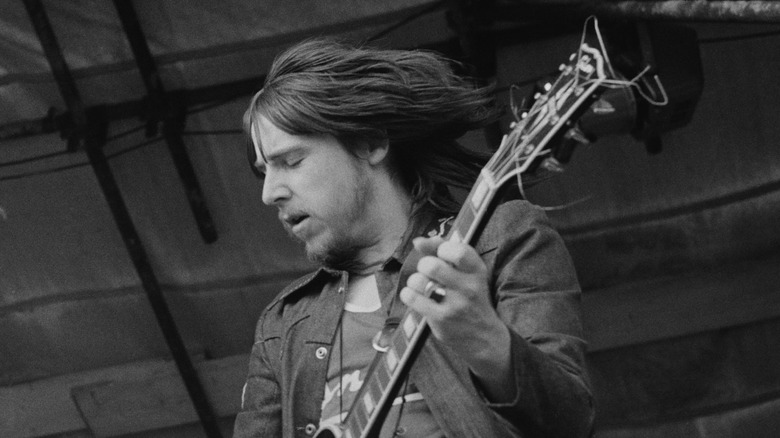Musicians Who Died In Freak Accidents
The relentless passage of time offers a constant reminder that life is finite. Fans of classic rock music have experienced that a lot in recent years, with the passing of such rock royalty as Eagles co-founder Glenn Frey, Rolling Stones drummer Charlie Watts, and chameleon hitmaker David Bowie. There will be many more rock icons shuffling off this mortal coil in the years to come, and tributes will be paid just as surely as their music will live on.
Yet there have also been many musicians from the past who have left us for reasons a world apart from the ravages of old age. From the assassination of John Lennon to the tragic overdoses of Jimi Hendrix, Janis Joplin, and so many others, the whys behind these deaths have been as varied as they were tragic. For some musicians, however, death at a far-too-young age came out of the blue from bizarre circumstances that nobody could have seen coming. Here's a rundown of some who died in freak accidents.
Keith Relf
As lead singer of the Yardbirds, Keith Relf was backed by three of Britain's most renowned guitarists in a band that launched Eric Clapton, Jeff Beck, and Jimmy Page. When the band broke up in the late 1960s (Page took control, with the New Yardbirds evolving into Led Zeppelin), Relf went on to a series of far less successful musical ventures. These included the prog-rock band Renaissance and another prog group, Armageddon.
Shortly after the release of Armageddon's 1975 debut album, Relf died in a freak accident at age 33. At the time, he was in his home's cellar, playing an electric guitar that was plugged into an ungrounded amp. When he rested his foot on a metal gas pipe, he was shocked by a powerful electric current that killed him instantly.
As Yardbirds drummer Jim McCarty recalled in an interview for website Please Kill Me, Relf's tragic death came at a low ebb in his life due to marital issues and career frustrations. "I saw him, actually, the evening he died," McCarty said. "It was really depressing. He was in a weird sort of hole, somehow. I was, to be quite honest, quite pleased to get away from him. It was really heavy. My mother used to work in the local police station; she was on the switchboard. She called me up the next day and said, 'Oh, I heard he's dead,' because the police were called in. It was a big shock ..."
Steve Peregrin Took
As co-founder of Tyrannosaurus Rex with frontman Marc Bolan, Steve Peregrin Took was instrumental in shaping the band's early folk-rock sound. In the studio, he contributed bass, drums, and added musical flair via various instruments, ranging from the kazoo to the Chinese gong. He was fired from Tyrannosaurus Rex in 1969, shortly before Bolan took the band to massive success with the 1971 album "Electric Warrior." Shortening the band's name and shifting to a harder-rock, fuzz-guitar sound, the band rechristened as T. Rex rode the glam wave to the top of the charts, propelled by hit single "Get It On."
As Took explained in a 1972 interview with NME, he'd felt he was being treated poorly by the band's management, who hated when he'd collaborate with such contemporaries as the Deviants and the Pretty Things. "The management would come and say, 'Boy, don't go and jam with this group, it's bad for the image,' and I'd go, 'What? What image?" he said. "I'm Steve Took, well-known drug addict.'"
By all accounts, Took floundered throughout the 1970s, his musical meanderings gaining little attention. On October 27, 1980, Took reportedly took a hallucinogenic substance and some morphine. At some point, a cocktail cherry became lodged in his throat, and he choked to death. Authorities ultimately determined those drugs hadn't contributed to his death, which had come from asphyxiation.
Terry Kath
A founding member of Chicago, guitarist Terry Kath can be heard on the band's hits in the early to mid-1970s. He also sang lead on numerous tracks and wrote several songs that appeared on various Chicago albums. Kath was also renowned in guitar-playing circles. Among his many fans were Eagles axeman Joe Walsh and Jimi Hendrix, who tragically died at age 28.
Kath had long held a fascination with firearms, an interest that yielded tragic results in January 1978. He paid a visit to Don Johnson, a Chicago roadie, and at some point in their conversation pulled out a .38 revolver he typically carried with him, spinning it on his finger before pointing it at his own head. This understandably freaked Johnson out, and he asked Kath to knock it off.
Interviewed by Corbin Reiff for Premier Guitar, Chicago trombonist James Pankow recounted what happened next. According to Pankow, Kath removed the clip from the gun, demonstrating to Johnson that the gun was unloaded — or so he thought. "He put the clip back in, and he was waving the gun around his head," Pankow said. "He said, 'What do you think I'm gonna do? Blow my brains out?' And just the pressure when he was waving the gun around the side of his head, the pressure of his finger on the trigger, released that round in the chamber. It went into the side of his head. He died instantly."
Mike Edwards
When Jeff Lynne merged classical music with rock in Electric Light Orchestra, he added a string section to achieve the lush orchestration behind such hits as "Evil Woman," and "Livin' Thing." Among those musicians was cellist Mike Edwards, a member of the band in its early days before departing in 1975. The flamboyant Edwards made an impression on fans, typically wearing a top hat and tuxedo in concert. After exiting ELO, he converted to Buddhism and renamed himself Deva Pramada for a time.
In 2010, Edwards was driving near his home in Devon, England, when a massive hay bale fell from a tractor that was working on farmland adjacent to the road. The hay bale went tumbling down a steep hill, gathering speed as it rolled until crashing into the front of Edwards' van. He then crashed into another vehicle. That driver was unharmed, but Edwards died when he was crushed by the weight of the hay bale.
"This was a tragic accident and we have now identified the victim as Michael Edwards, a founder member of ELO," Sergeant Steve Walker of the Devon and Cornwall police traffic unit told The Guardian. Speaking with BBC News, another officer, Inspector Andy Hamilton, added a comment. "Although it would appear to be a freak incident, we've got to thoroughly investigate the circumstances before we can draw any conclusions," Hamilton stated.
Les Harvey
Scottish rock group Stone the Crows was founded in 1969, centering on the dynamic combination of singer Maggie Bell and guitarist Les Harvey. The group quickly attracted the attention of Peter Grant, manager of Led Zeppelin. With Grant now steering the band's career, Stone the Crows was poised to become the next big rock sensation. Before that came to pass, however, tragedy struck during a 1972 show in Swansea, Wales, when Harvey was electrocuted onstage and died instantly.
According to Bell — who'd been planning to marry Harvey — he was the first member of the band to take the stage, and he hadn't noticed a loose wire that wasn't grounded. "It was a complete fluke, a tragedy," she said in an interview with the Daily Record. "We hadn't even started the gig — we were just doing the soundcheck. Leslie went to the microphone and said to the people, 'Please bear with us ... we've got technical problems here.' He touched the microphone and the guitar and that was it."
At first, Bell and the other members of the band weren't sure what had happened, but the painful truth became apparent. "We thought he'd just fallen over, but when I looked I knew he wasn't going to come back," Bell added. "It was terrible."
Randy Rhoads
After Ozzy Osbourne split from Black Sabbath and went solo, much of the success he experienced can be attributed to Randy Rhoads. The former Quiet Riot guitarist was just 22 when he joined Osbourne, and the pair went on to collaborate on such heavy metal hits as "Crazy Train," and "Mr. Crowley." Sadly, that musical partnership ended in 1982 when Rhoads died in a horrific accident.
The tragic story of Rhoads' death began when he boarded a small airplane, flown by the driver of Osbourne's tour bus. The driver — who didn't have a valid pilot's licence — thought it would be funny to "buzz" the bus, flying close to the vehicle while the other musicians were sleeping. On one of those passes, he flew too close and accidentally clipped the bus, shearing off one of the wings. This caused him to lose control of the aircraft, which crashed into a nearby house and exploded, killing all three people aboard.
"I was awoken from my sleep by a loud explosion," Osbourne later said in a sworn statement, via the Gibson website. His future wife, Sharon Osbourne, was also on the bus at the time, recalling her panicked fiancé running toward the burning house with a fire extinguisher. "And I just had no idea what had happened, and as I looked I saw that there were bits of plane everywhere, and bits of body parts," she wrote in her autobiography, "Sharon Osbourne: Extreme." "And it was just so hard to take in."
Charlie Colin
Bass player Charlie Colin was one of the founding members of Train, fronted by singer/guitarist Pat Monahan. He played on the band's first three albums, which spawned a number of hits that included "Meet Virginia," "Drops of Jupiter (Tell Me)," and "Calling All Angels." Colin exited the group in 2003, reportedly to deal with substance use and mental health issues. "Charlie is one incredible bass player, but he was in a lot of pain, and the way he was dealing with it was very painful for everyone else around him," Monahan told NBC San Diego of Colin's departure.
In May 2024, TMZ reported that Colin had accidentally died after slipping in the shower while house-sitting for a friend in Brussels. His sister confirmed that he'd passed away in what appeared to be a freak accident. According to reports at the time, it wasn't immediately apparent when he'd actually died, as his body wasn't discovered until the friends for whom he was house-sitting returned.
Jeff Buckley
Jeff Buckley burst onto the music scene on the strength of his first release, the 1993 EP "Live at Sin-é." The following year, he followed that up with his debut studio album, "Grace." Reviews were mixed, and the sales were disappointing. Far from a hit, "Grace" peaked at No. 149 on the Billboard album chart. In 1997, Buckley was in Memphis, where he was about to start work on his second studio album. One evening, he and roadie Keith Foti were hanging out on the bank of the Mississippi River, when he spontaneously decided to go for a swim. Foti cautioned Buckley as he strode into the muddy water. "You can't swim in that water," he recalled telling the singer, via Rolling Stone. Moments later, Foti lost sight of Buckley. He'd never see him alive again.
Several days later, a passenger on a riverboat spotted a body floating in the river, suspected to be Buckley's. Authorities spent days searching the river for the corpse until it finally washed up on the shore. Buckley was just 30. Observing the churning river, Buckley's road manager, Gene Bowen, told Rolling Stone, "Why would you even put your toe in that? But it's typical Jeff. He was a butterfly, you know? He was just like: 'Go with it.'" If there is any silver lining to the tragedy, it's that the success that had eluded Buckley arrived posthumously. His cover of Leonard Cohen's "Hallelujah" hit No. 1 in 2008, while "Grace" has gone on to sell more than 2.5 million copies.
Charmayne 'Maxee' Maxwell
R&B vocal trio Brownstone emerged in the mid-1990s, with the group's debut album, "From the Bottom Up," spinning off the hit single "If You Love Me." The sweet, soulful harmonies of the group's members — Nichole "Nicci" Gilbert, Monica "Mimi" Doby, and Charmayne "Maxee" Maxwell — sent the single to No. 8 and even earned a Grammy nomination. Sadly, Brownstone would never achieve the success experienced from that first album. When the 1997 follow-up record "Still Climbing" tanked upon release, Brownstone broke up. While they reunited for a few subsequent reunion projects over the years, with various new members, little came of those efforts.
In March 2015, Maxwell was at her home in Los Angeles when she accidentally fell. In a freak confluence of events, the fall caused her to drop a glass she'd been holding, which broke into sharp shards upon hitting the floor. When Maxwell hit the floor milliseconds later, her throat was slashed by a piece of that broken drinking glass. The singer's husband — music producer Carsten "Soulshock" Schack" — discovered her body when he returned home and immediately called 911. She was taken to a hospital, where efforts to save her proved futile. Maxwell died at age 46.
Kirsty MacColl
Kirsty MacColl broke through in the 1980s with such hits as "There's a Guy Works Down the Chip Shop Swears He's Elvis" and her cover of Billy Bragg's "A New England." She remains best known, however, for joining the Pogues for their venomous 1987 Christmas ditty "A Fairytale of New York." In 2000, MacColl was vacationing in the Mexican resort town of Cozumel with her two sons (whom she shared with her ex-husband, famed rock producer Steve Lillywhite) when she became the victim of a freak accident that resulted in her tragic death.
According to The Guardian, MacColl and her sons were scuba diving near a coral reef, accompanied by a diving instructor, in a protected area where boats were not permitted. Despite that, a 31-foot powerboat owned by wealthy Mexican supermarket tycoon Guillermo González Nova, one of Mexico's richest men, zipped through water at high speed — reportedly 18-20 knots — bearing toward MacColl and her sons. She managed to push her sons to safety, but was killed when the boat struck her. She was 41.
MacColl's mother led a nine-year effort to bring González Nova to justice called "Justice for Kirsty." But in 2009, she decided to suspend the campaign. "There have been lots of suspicious and dubious things about the case," MacColl family lawyer Demetrio Guerra told The Guardian, "but we have no proof that González Nova used his influence to get decisions that favored him."
Ola Brunkert
It's fair to say that Swedish pop quartet ABBA ruled top-40 radio during the 1970s, with countless hits ranging from "Waterloo" to "Dancing Queen." Providing the propulsive beat for those tracks was Swedish session drummer Ola Brunkert, who played on all the group's albums and toured with ABBA in 1977, 1979, and 1980. When the marriages of the members fell apart (Benny Andersson was married to Anni-Frid Lyngstad and Agnetha Faltskog to Bjorn Ulvaeus), the already-fraying relationships became one of the reasons why ABBA split up, ending one of the most successful pop groups in music history.
Brunkert eventually moved to Mallorca. It was there, in 2008, that he was found dead in the garden outside his home on the Spanish island. A subsequent autopsy revealed his death to be the result of a freak accident, probably caused by an accidental fall. A spokesperson for local law enforcement said that he had seemingly hit his head and then slashed his neck on the plate glass door in his dining room. Bleeding profusely, he wrapped a towel around his wounded neck and appeared to have been seeking help when he fell down in the garden and died. He was 61 years old.
Angie Stone
In the annals of hip-hop history, the Sequence played a large and early role. Founded in the late 1970s, the all-female rap trio consisted of Cheryl "The Pearl" Cook, Gwendolyn "Blondy" Chisolm, and Angie Stone. "A lot of female rappers say they've been there since Day One," rap pioneer Roxanne Shanté told Rolling Stone of the Sequence's status as groundbreakers. "I've been there since the night before. And they were there before that."
After the Sequence split up in the mid-1980s, Stone followed other musical pursuits before setting into a solo career, buoyed by such hits as "No More Rain (In This Cloud)" and "Wish I Didn't Miss You." That career was tragically cut short in March 2025 when the 63-year-old singer was on her way to a gig in Georgia, travelling in a van with nine other people, including backup singers and crew members. The vehicle reportedly skidded and flipped over before being smashed by a big rig. Stone was pronounced dead at the scene, the accident's only fatality. "Angie Stone's voice and spirit will live on forever in the hearts of those she touched," the late singer's spokeswoman said a statement to CNN. "Details regarding memorial services will be announced by the family in due course."












